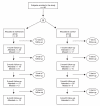Does naltrexone treatment lead to depression? Findings from a randomized controlled trial in subjects with opioid dependence
- PMID: 16496034
- PMCID: PMC1325065
Does naltrexone treatment lead to depression? Findings from a randomized controlled trial in subjects with opioid dependence
Abstract
Objective: Dysphoria and depression have been cited as side effects of the opioid antagonist naltrexone. We aimed to assess whether depressive symptoms are a clinically relevant side effect in a population receiving naltrexone as a treatment for opioid dependence.
Methods: We carried out a randomized controlled, open-label trial comparing rapid opiate detoxification under anesthesia and naltrexone treatment with continued methadone maintenance at the Alcohol and Drug Service, Royal Brisbane and Women's Hospital, Brisbane, Australia. The study subjects were patients stabilized on methadone maintenance treatment for heroin dependence who wished to transfer to naltrexone treatment. The Beck Depression Inventory, State-Trait Anxiety Inventory and Opiate Treatment Index subscales for heroin use and social functioning were used at baseline and follow-up assessments at 1, 2, 3 and 6 months.
Results: Forty-two participants were allocated to receive naltrexone treatment, whereas 38 continued methadone maintenance as the control condition. Participants who received naltrexone did not exhibit worsening of depressive symptoms. In participants attending all follow-up assessments, there was a trend for those receiving naltrexone to exhibit an improvement in depression over time compared with the control group. Participants who were adherent to naltrexone treatment exhibited fewer depressive symptoms than those who were nonadherent.
Conclusions: These results suggest that depression need not be considered a common adverse effect of naltrexone treatment or a treatment contraindication and that engaging with or adhering to naltrexone treatment may be associated with fewer depressive symptoms.
Objectif : On a mentionné la dysphorie et la dépression comme effets secondaires du naltrexone, antagoniste des opiacés. Nous voulions déterminer si les symptômes dépressifs constituent un effet secondaire pertinent sur le plan clinique dans une population prenant du naltrexone comme traitement contre une accoutumance aux opiacés. Méthodes : Au service de traitement de l'alcoolisme et des toxicomanies du Royal Brisbane and Women's Hospital, à Brisbane, en Australie, nous avons procédé à un essai contrôlé randomisé ouvert pour comparer une détoxification rapide des opiacés sous anesthésie et un traitement au naltrexone conjugué à un traitement de maintien soutenu à la méthadone. Les sujets à l'étude étaient des patients stabilisés par un traitement de maintien à la méthadone pour une dépendance à l'héroïne et qui voulaient passer au traitement au naltrexone. Nous avons utilisé l'inventaire de dépression de Beck, le questionnaire sur l'anxiété chronique et réactionnelle de State–Trait et les sous-échelles de l'indice des traitements contre les opiacés pour la consommation d'héroïne et le fonctionnement social afin d'effectuer des évaluations de référence et de suivi à 1, 2, 3 et 6 mois. Résultats : On a désigné 42 participants qui suivraient le traitement au naltrexone tandis que 38 sont demeurés sur le maintien à la méthadone comme condition témoin. Les symptômes dépressifs ne se sont pas aggravés chez les participants qui ont pris le naltrexone. Parmi ceux qui se sont présentés à toutes les évaluations de suivi, ceux qui prenaient le naltrexone avaient tendance à montrer une amélioration de la dépression au fil du temps, comparativement aux sujets du groupe témoin. Les participants qui ont observé fidèlement le traitement au naltrexone montraient moins de symptômes dépressifs que ceux qui ne l'ont pas observé. Conclusions : Ces résultats indiquent qu'il ne faut pas considérer la dépression comme un effet indésirable courant du traitement au naltrexone ou comme une contre-indication au traitement, et que l'on peut établir un lien entre l'engagement avec le traitement au naltrexone ou l'observation fidèle du traitement au naltrexone et des symptômes dépressifs moins nombreux.
Figures
References
-
- Volavka J, Resnick R, Kestenbaum R, et al. Short-term effects of naltrexone in 155 heroin ex-addicts. Biol Psychiatry 1976;11:679-85. - PubMed
-
- Sideroff S, Charuvastra V, Jarvik M. Craving in heroin addicts maintained on the opiate antagonist naltrexone. Am J Drug Alcohol Abuse 1978;5:415-23. - PubMed
-
- Judson B, Carney T, Goldstein A. Naltrexone treatment of heroin addiction: efficacy and safety in a double-blind dosage comparison. Drug Alcohol Depend 1981;7:325-46. - PubMed
-
- Farren CK, O'Malley S. A pilot double blind placebo controlled trial of sertraline with naltrexone in the treatment of opiate dependence. Am J Addict 2002;11:228-34. - PubMed
-
- Vining E, Kosten TR, Kleber HD. Clinical utility of rapid clonidine-naltrexone detoxification for opioid abusers. Br J Addict 1988;83:567-75. - PubMed
Publication types
MeSH terms
Substances
LinkOut - more resources
Full Text Sources
Medical

